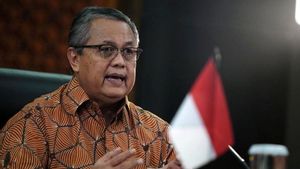JAKARTA - Bank Indonesia (BI) estimates that global economic growth will slow down in 2024. Although the uncertainty in the financial market has subsided.
BI Governor Perry Warjiyo revealed that he estimates that global economic growth will reach 3 percent in 2023 and slow down to 2.8 percent in 2024.
"The US and Indian economy remains strong, supported by household consumption and investment. Meanwhile, China's economy has slowed down as household consumption and investment remain weak as a follow-up impact of weakening the performance of the property sector and the occurrence of fiscal stimulus," Perry said in RDG BI, Wednesday, January 17, 2024.
Perry added that global risks need to be observed because it will affect the uncertainty of the world economy.
"Like, continuing geopolitical tensions, weakening the economy of a number of major countries, including China, and certainty of time and the amount of lowering the monetary interest rate of developed countries, especially the United States (US)," he said.
In addition, BI noted that the decline in inflation in developed countries including the US will continue even though it is still above the target of The Federal Reserve (The Fed).
However, Chinese inflation will decline in 2024 due to the economic slowdown, along with weak household consumption and investment as a follow-up impact of weakening the performance of the property sector and limited fiscal stimulus.
This condition will be in line with the cycle of rising monetary policy interest rates for developed countries that have ended.
Meanwhile, the US policy interest rate will still be high until the end of the first semester of 2024. However, it will decrease in the second semester of 2024.
SEE ALSO:
Meanwhile, the yields of government bonds for developed countries including US government debt securities are still at a high level.
Perry said that with the uncertainty of the easing financial market, the pressure to strengthen the US dollar on various world currencies, including developing countries, would also reduce the flow of foreign capital into developing countries, thereby reducing the pressure of weakening the exchange rate of developing countries, including Indonesia.
The English, Chinese, Japanese, Arabic, and French versions are automatically generated by the AI. So there may still be inaccuracies in translating, please always see Indonesian as our main language. (system supported by DigitalSiber.id)
















